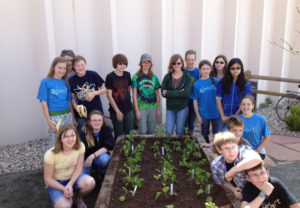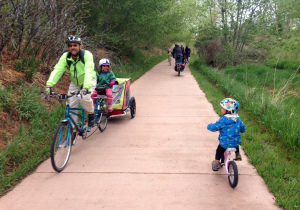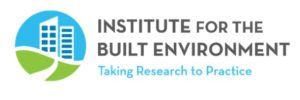Story by Katherine Vega
The Colorado Health Foundation has awarded a one-year, $192,495 planning grant to propose a model for a community health hub in northwest Fort Collins, located at Salud Family Health Center’s newest clinic.
CSU’s Institute for the Built Environment will lead the initiative to plan the proposed community hub guided by the following principle: “Make health less about medicine and more about community.”

Barriers to health
Members of the community face fundamental barriers to health and well-being, including food insecurity, lack of insurance and insufficient built environment infrastructure (like contiguous sidewalks).
The design of the envisioned Salud Community Health Hub, to be located at 1830 Laporte Ave., would offer a preventative approach to address such health factors.
The main idea is that the Health Hub will provide a centralized, inclusive space where Salud patients, providers, staff and local community members can easily connect to a network of local organizations and service providers to achieve improved health outcomes.
The members
IBE will help establish the Salud Community Health Collaborative, which will be the guiding advisory team during the planning phase of the project.
Collaborative members include Salud Family Health Centers, Food Bank for Larimer County, Vida Sana, Sproutin’ Up, Bike Fort Collins, One Health Institute at CSU, and the Built Environment Working Group at CSU.
Additional partnerships will be explored as the project progresses. The Collaborative is composed of community partners that represent all three spectrums of health: disease prevention, disease treatment and health generation.
Collaborative members will contribute their specialized knowledge and experience to the project, exploring ways to provide integrated care — connecting preventative health and primary care. For example, a treatment protocol may entail a Salud health provider writing a prescription for fresh fruits and vegetables to be filled at the Health Hub community garden and/or food pantry.

Ensuring access
To ensure the design of easy access by community members and create well-connected service facilities, the project team will examine both the surrounding built environment infrastructure and the health hub site designs.
Active design, universal design, healthy community design and other evidence-based design frameworks will ultimately influence a site plan that best supports this specific community’s health and well-being.
While the Colorado Health Foundation grant will make the design possible, additional funding will be required to build the vision.
Engagement
From the onset, the project team will engage service providers and local community members — foundational to the Health Hub’s development — to better understand their needs, barriers and opportunities for health and well-being.
Community members will contribute to the overall project vision through focus groups and one-on-one interviews. Further, IBE will facilitate hands-on design workshops to support community members in creating a unique vision for the Health Hub.
For additional information, contact Katherine Vega at katherine.vega@colostate.edu.
The Institute for the Built Environment is part of CSU’s College of Health and Human Sciences.

New funding to go to facilities, fellowships
By Kristin Breakell
CSU’s Institute for the Built Environment plans to use an infusion of new university funding to improve its facilities and establish a graduate student fellowship program.
IBE was one of five Programs of Research and Scholarly Excellence selected to share almost $500,000 from the CSU Office of the Vice President for Research to enhance the impact of its research, teaching and service.
IBE, which is located in historic Routt Hall near the corner of College Avenue and Laurel Street, integrates research and practice to advance the development of healthy, thriving built environments. IBE’s vision is to provide more opportunities for faculty and students at CSU to engage in interdisciplinary sustainability research and real-world projects.
By improving its facilities, IBE aims to create a more collaborative and active office environment. It will provide an atmosphere that supports interdisciplinary teams of on- and off-campus parties and helps students expand knowledge of sustainability topics beyond their program of study.
IBE also plans to use the funding to establish a graduate student fellowship program. Through its mentorship program, IBE has already trained more than 70 CSU students to enter the field of sustainability as job-ready professionals who make important contributions to the industry. The current program provides about 12 students a year the paid opportunity to work on real client projects — for example, customizing corporate sustainability programs, managing third-party sustainability certifications or helping cities develop new policies — while receiving mentoring.
With the seed funding received from the Office of the Vice President for Research, IBE will establish first- and second-year fellowships and forge deeper ties with CSU graduate programs to recruit top-notch candidates. Fellows will receive a tuition and conference stipend, as well as a paid assistantship. They will develop applied research resources — such as white papers, training guides and online courses—that help to advance sustainability in the built environment industry. IBE will cultivate donations and industry sponsorships of these resources to provide an ongoing funding stream for the fellowship program.
IBE alumni go on to work for top sustainability and construction firms.
“I landed my job as a green building consultant as a direct result of my time at IBE,” said IBE alum Dana Villeneuve, sustainability coordinator at New Belgium Brewing. “I left IBE full of inspiration, with a deep understanding of sustainability and the crucial role the built environment plays in a sustainable future.”
The IBE mentorship program provides thought leadership, optimizes team performance and develops leaders through project-based learning. The additional funding received from the Office of the Vice President for Research is an exciting next step for training the next generation of sustainability professionals.